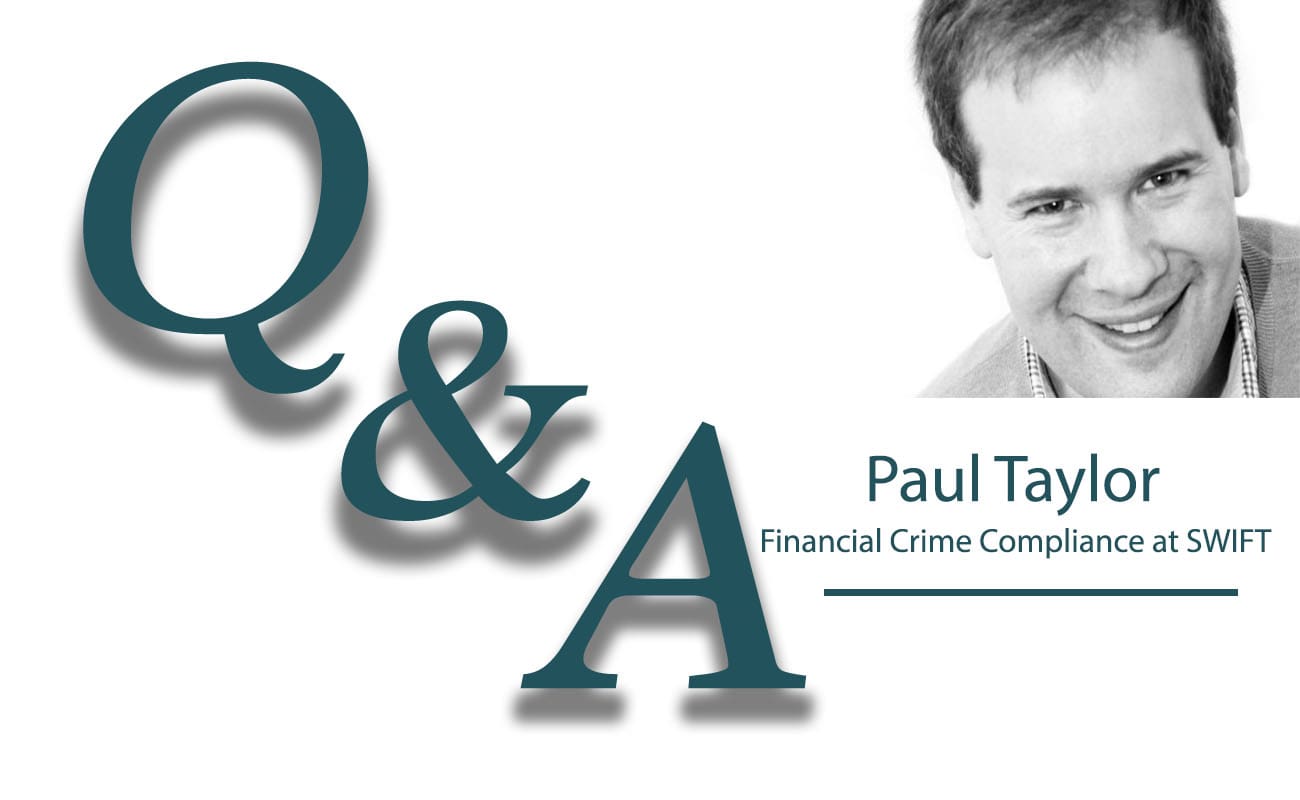Global Head of Product Marketing, Financial Crime Compliance Division
Maurice Gilbert: How did you get started on a career in compliance?
Paul Taylor: My initial exposure to compliance processes came about during my time in settlement-related roles, which naturally required elements of AML and sanctions control.
The decision to specialize in compliance, however, came in 2013 when SWIFT made the move of creating a dedicated Financial Crime Compliance business unit, providing a set of forward-thinking products and solutions to our members.
This was an easy decision for me at an exciting and critical time in the compliance industry, with firms seeking new, cost-effective and scalable solutions to meet the increasing demand of regulators and to offset growing budgetary pressures.
MG: Who helped shape your views?
PT: I am lucky to have a number of mentors and peers that I can turn to, both internally at SWIFT and externally as a result of the relationships I have established throughout my career.
I firmly believe that considering a variety of different viewpoints and listening to opinions from trusted advisors is crucial to forming your own opinions and views on topics and that we should use these feedback loops to shape the future evolution of our business.
MG: How do you stay current on ethics and compliance issues?
PT: It’s a huge and ever-evolving topic, but engagement with a wide variety of clients on a daily basis helps us keep abreast of the most pressing challenges and latest issues directly from those on the frontline.
We also meet regularly with regulators and other authorities around the globe, ensuring we know about all forthcoming legislative changes and requirements and can help our clients stay one step ahead.
MG: What are some of the significant issues facing CCOs, Risk Managers, etc?
PT: Cost is currently a huge issue. Viewing compliance as the responsibility of the banks is no longer sufficient and corporates face growing pressure to implement their own effective financial crime controls – but this can be expensive.
As a result, we are seeing corporates adopting the types of compliance solutions which have traditionally been used by banks, but with a particular focus on automation and process optimization to achieve the subtle balance between cost-efficiency and effectiveness.
We are also seeing a growing appetite for innovation amongst corporates. Many firms are looking to cutting-edge technology to address critical compliance processes, but in a measured manner so as not to expose themselves to unnecessary risk.
In particular, there is a move towards technology that enables a shift from transaction and pattern monitoring to a state of near intent monitoring, helping firms spot risks before they materialize.
Cybersecurity is also currently a key consideration. Learning about the threats, the risks, and which actions need to be taken to stay ahead of criminals is critical for any corporation operating in today’s environment.
MG: What do you believe is the optimal reporting structure for the CCO and why?
PT: The CCO performs a critical function and should be established in the culture and fabric of a company, ideally reporting to the CEO or at a minimum someone at managing board level.
It is also important for the CCO to maintain close links and contact throughout the organization, whether on the business side to help manage risk and profitability, or with their technology counterparts to assist in the drive to further automation and risk avoidance techniques.
MG: How do you see the CCO role evolving within the next 3 years?
PT: The CCO needs a deep level of technical knowledge and practical experience of compliance, as well as appropriate relationships across the firm and with relevant regulatory bodies. They need to be able to create a vision, oversee compliant solutions for the business and seek new technological innovations to move their business and control environment forward.
As we move into the future it will become even more critical for CCOs to understand new and emerging technologies, whether that is artificial intelligence, robotic-led cyber resilience or further evolution in the cryptocurrency space. The crossover of these technologies with more traditional compliance methods will be a major theme in the coming years.
In addition, the ability to join forces and collaborate with peers across the industry will remain important to facilitate dialogue on shared concerns and challenges as a group, as opposed to an individualistic firm-by-firm approach.
MG: How does your company help its clients mitigate risk?
PT: We offer a set of innovative and trusted technology solutions for sanctions, KYC and AML purposes, and will soon expand into fraud prevention. We build these solutions with our clients to ensure they take the most present and pressing challenges into consideration, and because of SWIFT’s cooperative, not-for-profit status, we can deliver them at scaled economy value.
This means that even the smallest of corporates can benefit from the same technology gains as the largest banks at minimal cost, thereby strengthening financial crime resilience across the industry as a whole.
MG: What new service offerings do you have in the queue?
PT: We have just released the latest version of our Name Screening solution, which allows millions of names in categories such as accounts, suppliers and employees to be screened against watchlists including counter terrorist financing and politically exposed persons, amongst others.
This is an important release for us, and we expect that over time this technology will achieve the same widespread usage as its sister product – Transaction Screening – which is one of the top platforms in the industry by user number.
Later this year we will also roll out our inflight fraud solution, which has been designed to help firms control the indicators of compromise we have identified and further bolster their fraud controls.
Working together to tackle financial crime has never been more critical. As the threats continue to evolve and grow, we will continue to collaborate with corporates, banks, regulators, authorities and industry bodies to develop more standardized, innovative solutions to the increasingly complex challenges faced by in our industry.
Paul Taylor is Global Head of Product Marketing for SWIFT’s Financial Crime Compliance division – focused on sanctions, know-your-customer (KYC), fraud and anti-money laundering (AML) analytics solutions. His career in financial services spans over 20 years and, prior to joining SWIFT in 2012, he worked in a number of senior positions in global investment banks such as Credit Suisse and Deutsche Bank. Paul is based in London.













